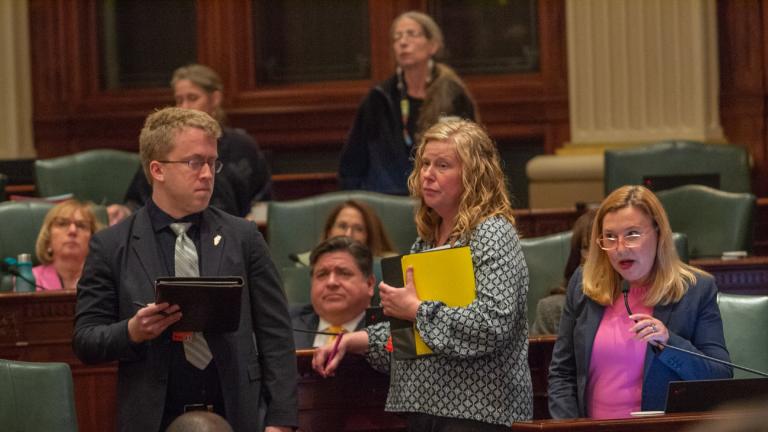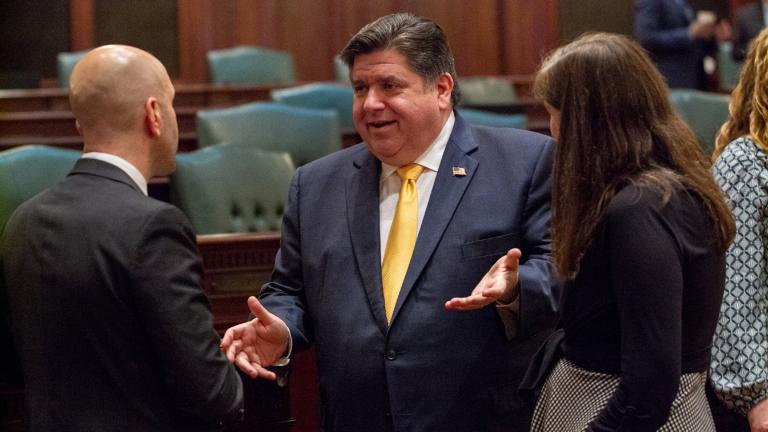Former Illinois House Speaker Michael Madigan held a tight grip on the gavel for 36 years – a term only interrupted by a two-year blip in the ‘90s.
His successor, Speaker Emanuel “Chris” Welch, is making headway on fulfilling a promise that would prevent anyone else from a similar reign.
Last Thursday – a day before Welch’s 100th day as House speaker – the chamber approved a measure (House Bill 642) that, starting in 2023, would limit legislative leaders to holding those positions for 10 consecutive years.
“I certainly hope that this is the first of many steps that will show the public that we’re serious about bringing about change here in Springfield, that we’re serious about rebuilding trust in our legislature,” Welch said.
Welch is the first Black person to serve as speaker.
He said Illinois took a “momentous” step toward resolving issues of policing in communities of color when in January – as he was locking up the votes to become the next speaker – the legislature approved a prodigious criminal justice bill (House Bill 3653) that allows individuals to anonymously complain about police officers’ conduct, establishes a process to decertify police found to have used excessive force, limits the police use of military-grade weapons, and will by 2023 eliminate cash bail in Illinois.
That plan does not end qualified immunity for police officers, though some Democrats continue to push for the state to do so.
During an interview Monday on “Chicago Tonight,” Welch indicated that he’s not currently among them, and instead believes Illinois should wait for the Black Caucus’ criminal justice law to have an impact.
“I think it’s important that we give that historic legislation some time to work because I do believe that it’s going to be a model for reform across the nation. I certainly think it’s a start, and we have more work to do but I think you have to let legislation work and assess it and determine where you go,” he said.
Welch, whose served as chair of the Proviso Township High School Board of Education before becoming a member of the General Assembly in 2013, voted earlier this month in favor of House Bill 2908, which creates a 21-member elected school board for Chicago Public Schools.
In a recent press release, Welch called it an “excellent bill,” saying, “We have been working for years to help create a more equitable Board of Education in Chicago and this is one step closer.”
Chicago Mayor Lori Lightfoot, who campaigned on an elected school board for CPS, opposes the measure, saying a board that size would be unwieldy.
(The Senate has advanced a mirror plan, SB 2497, which Lightfoot also opposes.)
Lighfoot instead wants the legislature to back a hybrid plan, which would continue to give the mayor control to appoint some members of the school board while others would be elected (Senate Bill 827).
Welch said his support for the all-elected board is consistent with his long-time position, given that he credits his time on Proviso’s school board for having “prepared me well for what I do here in the legislature.”
But he signaled he’s open to negotiations, as both sides attempt to work out an agreement on CPS’s future.
“This is the legislature, and negotiation is an important part of what we do and I think it’s important to, you know, get the parties around the table and see if we can come to some common ground,” Welch said. “I think that’s just the right thing to do.”
It’s unclear at this point what other ethics-oriented measures could pass before spring. After a serious of corruption scandals including the Commonwealth Edison bribery saga aimed at Madigan — though the speaker has denied any knowledge of it and has not been accused of breaking any laws — legislators have talked about taking steps like strengthening conflict-of-interest rules officials must follow and banning lawmakers from immediately becoming lobbyists after leaving the General Assembly. But so far, no major ethics package has materialized.
The term limits measure now moves to the state Senate, which already has rules – a legislative protocol that carries less weight than law – limiting the terms of the chamber’s president and minority leaders.
Welch said pushing term limits is fulfilling a promise he made to his colleagues.
During his inauguration speech, Welch made other promises. He said that politics has gotten too divisive, and that he’ll usher in a “new day” by working with lawmakers from both sides of the aisle.
Rep. Tim Butler, R-Springfield, last week called that pledge “B.S.”
Even as the House debated a flurry of bills, Butler said Welch jammed a bill he’s sponsoring (House Bill 2994) that would pave the way for voters to choose whether two central Illinois townships could merge, despite Butler’s plan having bipartisan support.
In an emotional speech on the House floor, Butler threw a paper calendar.
“We represent 5 million Illinoisans on this side of the aisle. Five million! And our bills are being ignored. I’m sick of it. Sick, sick, sick of it. It’s supposed to be a new day,” Butler said.
Welch called Butler’s tirade “posturing” and “the type of political rhetoric that has to be lowered.”
Bills sponsored by Democrats have passed the House at a 4-1 ratio compared with those sponsored by Republicans.
Welch said it’s rhetoric to insinuate that he’s not working across the aisle, saying that the lopsided bill passage makes sense given that Democrats outnumber Republicans in the House by 73-45.
“We’re a supermajority. Those number are never going to be even,” Welch said.
That supermajority in both the House and Senate, as well as Democrats’ control of the governor’s office and the state Supreme Court, means the party has sole jurisdiction over drawing the state legislative and congressional districts that will help to determine partisan control in Illinois for the next decade.
Numbers released by the Census Bureau on Monday mean that Illinois will lose a place in Congress, leaving the state with 17 – rather than 18 – seats in the U.S. House.
Former President Barack Obama has called for an end to the gerrymandering and partisan-motivated maps, and groups that campaign for transparency and other so-called “good government” reforms, including Change Illinois and Common Cause Illinois, say legislators shouldn’t be in charge of drawing their own district boundaries and want to give that duty to an independent commission.
In 2016, Welch also favored an independent commission.
In an op-ed, he wrote that he backed a constitutional amendment (HJRCA0058) that would disqualify current and recently elected officials from drawing a map; instead, an eight-member appointed panel would be tasked with the job.
“This proposal is a win-win for Illinois,” Welch wrote, saying that the commission would be required to draw districts that “reflect the ethnic, gender, and racial demographics of Illinois.”
A commission would also “make the redistricting process more transparent and take the process out of the hands of elected officials,” he wrote at the time.
We asked Welch what’s changed since then.
“Everything I pushed for then … I’m pushing for now. Like protecting minority representation and ensuring one person one vote. That’s exactly what I’m fighting for now. We are doing this through a very thoughtful, transparent and community driven process,” he said. “The principles that I stood for in 2016 are the same principles I stand for now.”
Welch said he is committed to getting a map passed ahead of an end-of-June deadline that would transfer control of redistricting to a bipartisan legislative panel.
Critics have said Illinois is rushing the process, given that delayed information from the federal government means the state won’t have the latest census figures until sometime in August or even September, meaning that whatever map Democrats come up with will have to be based on less-specific data such as that from the American Community Survey.
Follow Amanda Vinicky on Twitter: @AmandaVinicky








